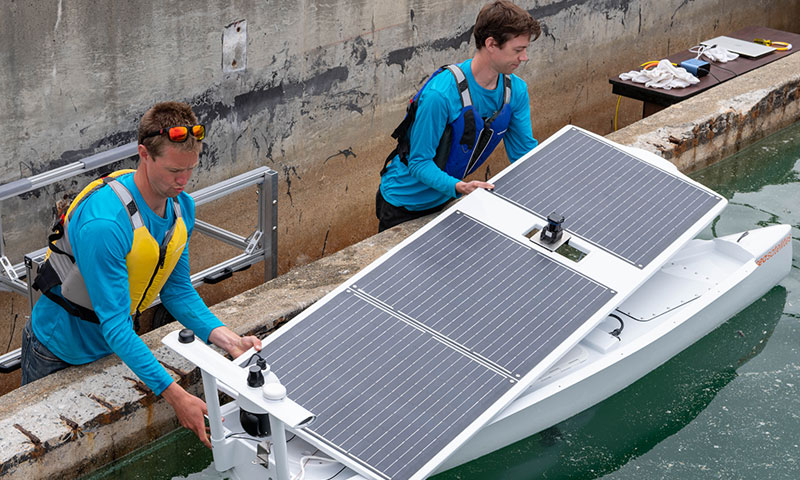The Joint Interagency Field Experimentation (JIFX) program at the Naval Postgraduate School (NPS), held quarterly, recently added another warfighting domain to its range of venues used to conduct field experiments – water.
Situated just across the street from NPS’s main campus, the Sea Land Air Military Research Initiative (SLAMR) facility houses a series of open-air water treatment tanks that were recently renovated and now serve as SLAMR’s aquatic environment laboratory. The addition of these water tanks to the JIFX portfolio of regional facilities, test ranges, and experiment venues, including controlled air and ground space at California National Guard base Camp Roberts in South Monterey County, allowed JIFX to offer opportunities for not just air, land or cyberspace experiments, but for experiments with sea-based surface and subsurface technologies as well.
JIFX aims to foster collaboration between military, commercial industry, and academia to experiment with and evaluate emerging technologies for defense-related applications. This latest JIFX iteration, held May 24-28, hosted 220 participants representing 73 unique organizations that took advantage of the JIFX field and aquatic labs.
Participants were able to showcase their latest technologies, and in some cases, test and evaluate them either in simulation or live on location at Camp Roberts or in Monterey where underwater, ground and airspace were available.
"The new SLAMR facility here is intended to allow us to simultaneously engage terrestrial systems, subterranean systems, aerial systems, surface systems and subsurface systems in one," said JIFX Director Dr. Raymond Buettner, NPS Associate Professor of Information Sciences. “The Aquatic Laboratory adds water experimentation, the key naval warfighting domain, offering a chance for participants and NPS faculty and students to conduct water-based experiments focused on maritime defense capabilities and applications.
“Through these experiments, private industry can learn what the government is interested in, and the government can get a look at what the commercial world is developing,” continued Buettner.
The new facility also offers students who are considering maritime research projects, or whose rigorous academic schedules may not always allow them to visit Camp Roberts, a chance to participate in JIFX. Buettner added there are future plans to add dry tanks for ground exercises and a structure to allow for limited flight experimentation at the SLAMR facility.
NPS PhD student U.S. Navy Lt. Nabil Tahan was on hand at the aquatic lab to observe and evaluate JIFX as a venue for his own future research. He specifically was able to take a look at a high-performance computing system developed by Texas-based TMGcore, which has a proprietary liquid cooling system that reduces the hardware down to a very mobile platform. Having served in a medical unit in Kandahar, Afghanistan, Tahan immediately recognized how the mobile computing capability could help forces downrange.
“Field medical facilities can range in their capabilities, and a high-performing system could manage medical data on trauma victims and help move critical data quickly potentially saving lives,” said Tahan.
Tahan went on to note that the majority of NPS students have significant operational experience, and having seen JIFX firsthand, he believes it is an avenue that allows students to translate that experience, their academics, and emerging technology into field experiments.
"A fully operational laboratory and experimentation incubator, especially a maritime experimentation tank designed for student and industry use, right in the backyard of NPS is of utmost importance,” said Tahan. “The focus on maritime research adds a critical layer of credibility and power to student research connecting experimentation to NPS’ naval roots in the maritime domain.”
For Buettner, expanding facilities and their capabilities should open more doors for future experimentation, and he believes the biggest benefit for JIFX will be one that JIFX has been doing for two decades – an enhanced ability to connect technology experts, evaluators and end-users to further develop technologies for national defense.
"When you think about what we try to accomplish at JIFX, we're trying to create a learning environment where each of the learners gets what they need," said Buettner. "NPS is perfectly appropriate because it creates the learning environment, and companies come to learn about what the latest government requirements might be and what the national security challenges are, and then the government entities come to learn what the cutting edge of the industry looks like."


